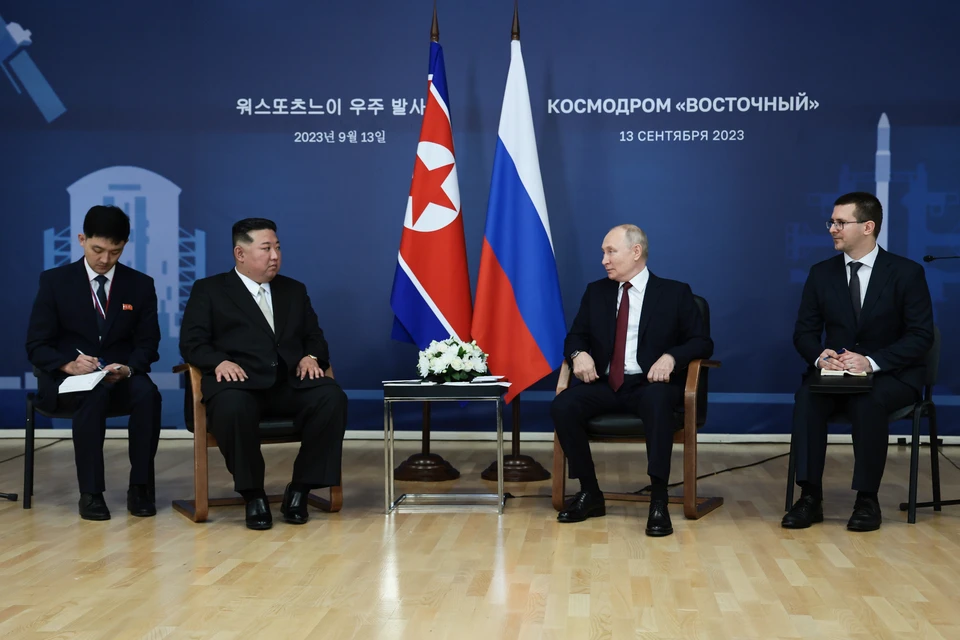
The total duration of meetings in a wide and narrow composition of the delegations of the Russian Federation and the DPRK was about 4 hours
Photo: TASS
Vladimir Putin And Kim Chen In four years later they met again – this time at the Vostochny cosmodrome.
The total duration of meetings in a wide and narrow composition of the delegations of the Russian Federation and the DPRK was about 4 hours. What the leaders talked about one-on-one remained between them – there were no briefings and memoranda on the agreements concluded.
On the radio “TVNZ» discussed the topic of the meeting and its consequences with a leading researcher at the Center for Korean Studies at the Institute of Far Eastern Studies of the Russian Academy of Sciences Konstantin Asmolov.
– What lies ahead for us in relations with North Korea after the current September meeting of the two leaders and delegations?
– Against the backdrop of global turbulence, Moscow and Pyongyang will try to strengthen cooperation, since it is due to a common threat in the form of the collective West. It is obvious to experts that the wave of demonization of Moscow and Pyongyang, including regular rumors about the arms trade, is intended to set off the formation of a Washington-Tokyo-Seoul bloc in the region. A significant step forward has been made in this direction.
– Formation of an analogue of the Asian NATO?
– This was confirmed after the August summit at the American Camp David with the participation of the presidents of South Korea and the United States and the Prime Minister of Japan.
– Will Moscow and Pyongyang begin to build a new set of deep mutually beneficial relations or are we talking about one-time defense contracts?
– What will develop next, as one might assume, is a situation of cooperation due to a common threat.
– So what specific forms will this take?
– This will depend on the development of the economic and political situation around our countries. I repeat: before our eyes, blocks are beginning to take shape; they may have different formats, and this is not a one-time partnership, because Moscow, Beijing and Pyongyang will simply be forced to actively stick together.
– In the 2000s in Russia one could hear the dismissive: “Do you want it like in the DPRK?”
– This was heard quite often from people who remember the DPRK as a caricatured “evil state.” This perception has been formed since the times when our dissident intelligentsia subscribed to North Korean magazines instead of the Krokodil magazine.
– Did this distorted idea later play a negative role in our relationship?
– There is a feeling that our country once missed the moment when the North of Korea seriously got back on its feet. And now, despite the peculiarities of the regime, this is a country that has a serious industrial and engineering personnel base. Even though the launches of their satellites and missiles are not always successful, regular exercises using ballistic missiles and other variants of the nuclear missile component should tell us that this country is quite developed. And there are no cardboard dummies of formidable weapons – everything is serious there.
– They reached this level, including thanks to our specialists and specialists from the former republics of the USSR?
– Including. In general, the pace of development of the DPRK is perhaps most frightening to those who liked to talk about the backwardness of North Korea. As for the other image in the mass consciousness… In fact, before catching up with North Korea, Russia can see if it can catch up with South Korea, with its strict anti-extremist legislation, the Internet with a passport and other things that are now difficult for us to imagine in our reality .
– Is it true that, despite the serious support of China, which stands behind the DPRK, the country prefers to live by self-sufficient labor?
– The conversation about the extent to which North Korea has a “self-sufficient” economy is largely debatable. Economic problems are recognized by the country’s leadership itself. It must be remembered that North Korea is not China or Russia in terms of almost limitless resources. But they are trying to build a similar economic model.
– In connection with recent events, there is more and more talk about the military component of our ties, but to what extent is this possible?
– Everyone is talking about hypothetical options – like supplying Soviet-caliber shells to Soviet artillery systems. Or about the participation of North Korean fighters in the Northern Military District…
– And in fact?
– It has already been said about options for joint exercises, both bilateral and trilateral. Or about the fact that North Korean satellites will be launched on Russian rockets. This is, in fact, a much more important area of cooperation.
– That is, space?
– Including space.
– When talking about missiles, do you mean military ones, too?
– No, this is exactly what was proposed. Let me remind you that North Korea is formally prohibited from launching satellites into space, since these are ballistic missiles, and such a launch vehicle is practically no different from a combat one. And the launch of North Korean satellites, which the DPRK really needs, on Russian rockets largely solves this problem.
– In Russia, many have heard about the Juche idea, but few understand what it is.
– The simplest way to translate Juche into Russian is sovereignty. It is worth recalling that North Korea has already outlived the Soviet Union in terms of the total life expectancy of a sovereign state with its own special path of development.
LISTEN ALSO
What could Vladimir Putin and Kim Jong-un agree on (more details)